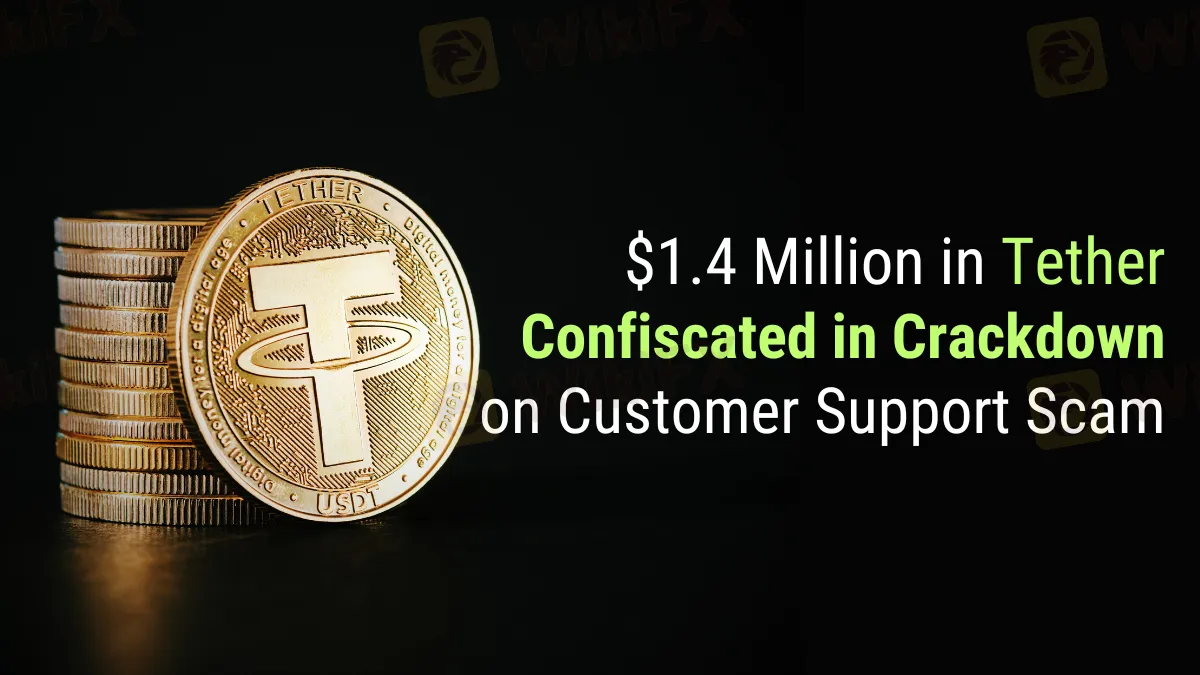简体中文
繁體中文
English
Pусский
日本語
ภาษาไทย
Tiếng Việt
Bahasa Indonesia
Español
हिन्दी
Filippiiniläinen
Français
Deutsch
Português
Türkçe
한국어
العربية
$1.4 Million in Tether Confiscated in Crackdown on Customer Support Scam
Abstract:US Attorney's Office seizes $1.4M in Tether from scam, exposing tactics targeting vulnerable populations. Implications for crypto regulations & DeFi.

In an enormous attempt to stop fraudulent activities, the United States Attorney's Office in Chicago, Illinois, has taken down a customer service scam business and seized about $1.4 million in Tether (USDT). This operation highlights the evolving tactics used by fraudsters in the Internet age, namely targeting the elderly and other vulnerable populations.
Tether, the DOJ, and the FBI were in charge of organizing the theft on March 12. Scam pop-ups said that the victims' computers had taken over as a component of a larger scheme. They informed the victims that their bank accounts were at risk when they called the fictitious customer service number. Following their deception of the victims into thinking USDT would safeguard their property, the scammers asserted their ownership of the tokens.
An uncommon accomplishment in the battle against digital fraud is the successful recovery of USDT from an unhosted digital currency wallet, which sets this instance apart. A January 24 document reveals that the money seized was painstakingly traced to five separate wallets linked to a wire fraud scheme, even if the precise details of the recovery procedure are still unclear. Money laundering may have occurred because intermediate addresses transmitted small amounts of money.
Despite conducting a significant portion of its activities in foreign countries, Tether remains subject to regulatory oversight by the Office of Foreign Assets Control (OFAC) of the United States. The recent sanctioning of Tether's association with Tornado Cash, an Ethereum network coin mixer, by OFAC, underscores the need for international collaboration in the battle against money laundering in the cryptocurrency business.
Future stablecoin rules will provide Tether with significant challenges in the long term. According to recommendations made by organizations like JPMorgan Chase, the government may ultimately favor stablecoins that adhere to AML and Know Your Customer (KYC) regulations. These restrictions are becoming more open. The decentralized finance (DeFi) sector could potentially experience substantial transformations in light of these legal developments, considering the USDT's significance as a collateral and liquidity resource. Ensuring the protection of consumers against fraudulent activities continues to be a principal consideration as the digital banking industry progresses.

Disclaimer:
The views in this article only represent the author's personal views, and do not constitute investment advice on this platform. This platform does not guarantee the accuracy, completeness and timeliness of the information in the article, and will not be liable for any loss caused by the use of or reliance on the information in the article.
Read more

Thinking of Investing? Read Must-Know Facts About Funding pips!
When you check the internet for Funding Pips, you'd be surprised to know it's filled with praise for Funding Pips but often lacks the real facts that traders need. Everything that seems too good to be true should always be verified first. It could be Fraud . So, we conducted research and collected several facts you must know about Funding Pips.

OctaFX Back in News: ED Attaches Assets Worth INR 134 Cr in Forex Scam Case
The Enforcement Directorate (ED) in Mumbai has attached assets worth around INR 131.45 crore. This included a luxury yacht and residential properties in Spain. Read this interesting story.

Oil Prices Stay Firm on Solid US Jobs Data
Oil prices stayed firm this week as the US labour department posted a better-than-expected payroll data in June 2025. Read this news in detail.

CryptoCurrency Regulations in India 2025 – Key Things You Should Know
Cryptocurrency has become a major trend in today’s world. Crypto Experts believe it’s the future, which is why many people are investing heavily in it. But before jumping in, it’s important for crypto enthusiasts to understand the key rules about cryptocurrency in India.
WikiFX Broker
Latest News
CFD Brokers Face Dual Compliance Pressures Ahead of 2026: Australia and EU Tighten Rules
Services Surveys Signal 'Expansion' In June, Inflation Fears Remain High
Major Risks Associated with AuxiliumFX: You Need to Know
ASIC cancels AFS licences of Ipraxis and Downunder Insurance Services
CFI Financial Group Becomes Official Online Trading Partner of Etihad Arena
FxPro to Launch Crypto Trading Desk, Deepening Digital Asset Push
Global Brokers Vs. Indian Rules: Why They Struggle in India
Discover 5 Benefits of Trading with Trive FX Broker
Indian regulator bars U.S. firm Jane Street from accessing securities market, impounds $566 million in manipulation probe
Asia-Pacific markets trade mixed ahead of Trump's deadline for higher tariffs
Currency Calculator


